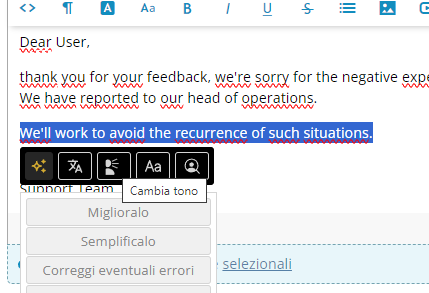I believe that integration can be achieved step by step.
Full Integration: One thing is for the operator to be able to get an answer tailored to the customer’s specific problem directly, and yes, this case requires a complex integration work, and it would be necessary to train the AI with the entire archive of questions/answers.
Light Integration: Another thing, however, is to put the operator in a position to respond more quickly with advanced tools.
My project/suggestion:
Given that the help desk I manage caters to an international clientele that uses our e-commerce service, our operators often have to deal with complaints in different languages that address sensitive issues like "money."
For this reason, waiting for version 2.0 of OsTicket, I created a script that, when text is selected, displays a small menu next to the selected text where the operator can:
- Translate the text into the preferred language
- Change tone of the message (assertive, informal, empathetic, etc.)
- Improve text (make it longer, shorter, simpler, correct errors, etc.)
The very nice thing is that by using the innerHTML method, the operator can select and translate the content of the user's ticket into their own language without copying/pasting into external translators. 😉
Demo:

I wanted to package the code in a plugin, but unfortunately I can't make $ost->addExtraHeader(<script>) work in a plugin.




